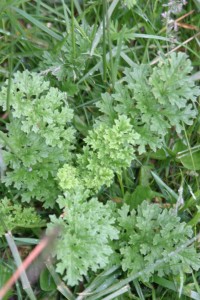My permaculture class had a great discussion over the weekend about exotic, invasive plants. These noxious weeds are thriving in the conditions where they are most needed. The conditions where they grow are the very places where the land has been disturbed. They are the ones working hardest to heal the land, and are building the soil up to support the next stage of species progression.
I illustrated the class discussion with how burdock is breaking up the compacted clay soil around my driveway, and how scotch broom is adding nitrogen to some of my worst areas of sterile fill dirt. Others pointed out beetles are attacking mature Grand Fir trees but ignoring the young trees, as nature’s way of saying the soil & forest needed the decaying wood it was deprived of from successive lumber harvests. English ivy is a problem because it pulls down trees, but by doing so, it destroys it’s own shady habitat so another species can progress.
It was a good discussion and it got everyone thinking about invasive plants in a new level of awareness. There were also thoughts about how to include these hard working plants into permaculture holistic designs. The solution to the “problem” of invasive plants is not to eliminate the plants, but rather change the conditions that favor them.
On my way home I made a connection between the concept of conditions & processes with Christianity. The condition is man’s separation from God, and it results in a destructive cluelessness for everyone affected. Since we don’t know how things in life work together, we aren’t able to make things work–remember the saying that life doesn’t come with a users’ manual? We wear down our bodies with poor diet, lack of sleep, and destructive behavior. If that isn’t bad enough, we share our poor performance with those around us and end up with flawed relationships. There is a technical term for this process: “sin”. I am thoroughly convinced that the logic of Romans 6:23 is biconditional: 1. Sin brings Death. 2. Death indicates Sin. If something you are doing is destructive, then it is sinful.
Let me illustrate my point this way: This past week has been a very busy one for me and I’ve cut back on my sleep hours in order to get other work done. Sleeping 5 hours/night will eventually rob my health and kill me. So why do I do it? Because my situation makes this destructive behavior flourish. I’m a slave to my sinful condition. Not getting enough sleep shows that I am sinful.
The question is now: “How do we get rid of noxious weeds and invasive, exotic plants”? My answer to this is to listen to what the plants tell you, and you put things where they go. Ivy says the ground needs sunshine & organic matter. Scotch broom says the soil needs a source of nitrogen. Tansy ragwort screams out “don’t graze me” because it comes when the pasture is being managed wrong. Use appropriate tools to help these deficiencies.
The real question is now: “How do we get rid of noxious sin, and invasive, exotic death?” Failing health says everyone will eventually die–everyone is mired in sin. My failures tell a lot about me. Use Gods appropriate solutions to fix the condition and get free from the cause of death.
Permaculture Design Principles:
1. Save the People
2. Save the Planet
3. Recycle the Surplus
God is the ultimate “permaculturist”. He was using the permaculture design principles before Bill Mollison ever wrote them down.
Permaculture is all about original sin.

